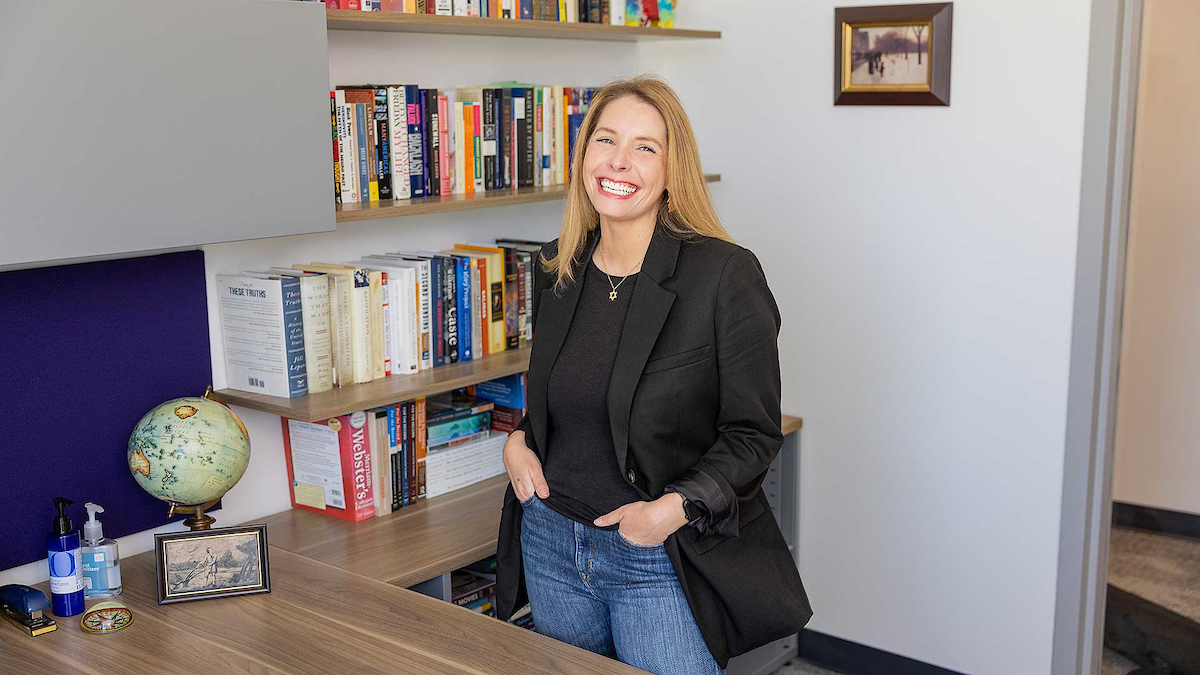CSUMB Faculty member encourages dialogue as part of Jewish American Heritage Month

Meghan O'Donnell is hoping that productive dialogue can be spurred during Jewish American Heritage Month. | Photo by Brent Dundore-Arias
May 8, 2024
By Mark Muckenfuss
Meghan O’Donnell says being a Jewish kid in a small conservative community near Lake Tahoe wasn’t always easy.
“I grew up in a community where we were only one of two Jewish families,” said O’Donnell, a Cal State Monterey Bay lecturer in history. “I know what it feels like to feel scared and isolated in a community that you feel doesn’t support you or understand you.”
Fortunately, she said, that is not what she has experienced in her 13 years at CSUMB.
“I’ve found CSUMB to be a very supportive space,” O’Donnell said.
But, she added, more can be done and she thinks May, which is Jewish American Heritage Month, presents a good opportunity for greater education, dialogue and understanding.
“It's a great opportunity for folks to learn more about our traditions and history, and the diversity of our experiences as Jewish people,” she said. “I think it's really important to recognize all of the various ethnic and racial identities of folks.”
O’Donnell feels it’s of even more importance to smaller minorities, such as Jews, because there is often misunderstanding and even misinformation among the greater public.
“Both Jewish identity and our traditions are exceptionally diverse but that diversity is not always well understood in non-Jewish society, and I think a lot of people aren’t exposed to the richness of Jewish religion and culture,” she said.
As a historian, she believes the history of Jews, particularly in America, is important. Much of it involves the age-old trends that define the histories of many racialized and marginalized groups in America: struggle, discrimination, acculturation and segregation. But there is also resilience and resistance in the face of all of that which is important to highlight, she said.
“Jewish history is a really interesting case study on how race and whiteness operate in our society,” she said. “I think there are lessons to be learned as a result of the Jewish experience in the United States as it relates to race and ethnicity.”
Many Jews, such as O’Donnells’ mother’s family, came to the United States near the turn of the 20th century, often to escape the pogroms in Russia and Ukraine. Over the years, they faced redlining, which barred them from certain neighborhoods, racial covenants, which kept them out of clubs and organizations, as well as other forms of discrimination.
“There is a really deep, deep history of antisemitism in the U.S,” she said. “I think some people are surprised once they learn our history and how pervasive and normalized antisemitism was. Many don’t even realize there was a very strong Nazi presence throughout the United States, including California, leading up to and during World War II. That presence, in the form of neo-Nazis and neo-fascists, persists into the present day.”
Then, of course, there was the Holocaust.
“Most of our education on Jewish history centers around the Holocaust,” she said. “Although that's really important, I think there are some problems with that. Jewish identity and history are much deeper and richer than that one thing.”
Some resources she suggests for those wanting to know more about Jewish American heritage include:
- “The U.S. and the Holocaust,” by Ken Burns, a documentary that looks at Jewish history in America leading up to, and including, the Holocaust
- “The Netanyahus,” by Joshua Cohan, a novel set in the 1950s, which uses history and humor to portray a fictionalized account of Harold Bloom's encounter with Benzion Netanyahu and his family, including his son, Benjamin Netanyahu, at an upstate New York college
- "Being Jewish," by Ari Goldman
- "Revolutionary Yiddishland: A History of Jewish Radicalism,” by Alain Brossat
- "King Solomon's Table: A Culinary Exploration of Jewish Cooking from Around the World,” by Joan Nathan
In keeping with CSUMB’s commitment to an inclusive campus environment, the current situation in Israel and Gaza makes this a particularly important time for understanding not only Jewish culture and history, but that of Muslim, Arab, and Palestinian peoples as well, O’Donnell said. Antisemitic acts have escalated in recent months.
“We’re facing a really critical moment right now,” she said. “I think it’s an opportunity to come together and have a dialogue, to bring folks together around this current moment.”